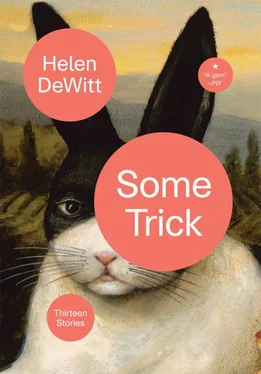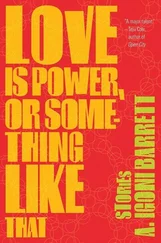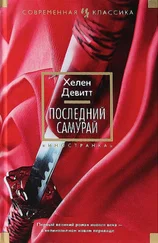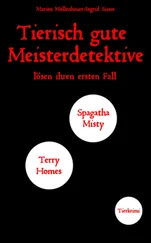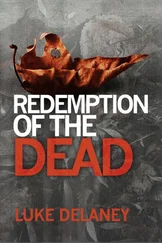Edward bounds gaily into the house, the happy wanderer with his little light backpack of essentials, and she follows him slowly, carrying the luggage.
‘Shall we have some people to dinner for a housewarming?’ she asks, and sees her words thin into the air like vapour off early morning water.
‘Oh, yes, we must,’ says Edward, and they do.
Edward and Maria sit at opposite ends of the dining room table, and between them are six or seven friends. They fill glasses, urge seconds, swap honeymoon anecdotes — the friends are married, they have their share.
‘A yacht,’ says Sarah. ‘Crumbs. George and I went Eurorail! You must have felt frightfully grand.’
Edward opens his mouth.
‘Oh,’ says Maria, ‘Edward was sickeningly blasé. One really felt it was an awful come-down for him. Have you ever told them about the splendour amidst which you were shipwrecked, darling?’
Everyone has gone, and Edward and Maria repair to the kitchen to tackle the washing up. Edward scrapes and stacks; Maria fills the basin with Fairy Liquid and steaming water. As she lets the first stack of dishes sink beneath the suds she begins to sing softly.
‘o when the saints, o when the saints, o when the saints come marching in’
‘how i long to be in that number,’ sings Edward, ‘when the saints come marching in.’
‘O WHEN THE SAINTS. O WHEN THE SAINTS. O WHEN THE SAINTS COME MARCHING IN! HOW I LONG — TO — BE — INTHATNUMBER, O WHEN THE SAINTS COME MARCHING IN.’
o when the saints (o when the saints) come marching in (come marching in) o when the saints come marching (marching in), how I long to be in that nu-u-mber. When the saints come marching in.
OXFORD, 1985
‘Structuralism is out of fashion anyway,’ says Brian, who likes to be a kind of thinking man’s Philistine. He slides a spoon into raspberry sorbet.
‘Post-structuralism is out of fashion,’ says Jane. They’re married, it isn’t really surprising.
‘Fashion is out of fashion,’ says X, in the tone of voice that makes you think ‘quipped’.
‘Fashion is out of structuralism,’ say I. It’s nice when they leave you the best line. X doesn’t like it, though. Didn’t see it coming.
‘I liked that pasta alla Gorgonzola,’ I say to Jane. ‘Is it really so easy? How do you do it?’
Cross looks round the table. I blush, as so often. It was an intellectual conversation. Jane doesn’t want to answer, she resents being dragged down to this level.
‘Oh, you improvise like mad,’ she says airily. ‘Gorgonzola and sheep’s yoghurt are the only essentials.’
This is not very helpful, but I don’t like to press her. Brian starts telling stories about Derrida: perfectly happy, it seems, to accept all the privileges of the author. Theories of authorial absence, says Brian, tend to leave out the curious circumstance that the author is always there to pick up his cheque.
X does not seem to resent this. X says as a matter of fact Derrida is a stickler about copyright.
I’ve finished my sorbet. I finish my coffee. I start thinking about the death of Voltaire.
X and I have a long way to walk home afterwards — X lives up the Abingdon Road, I live in Osney. It’s about midnight when we leave, and the Woodstock Road is deserted but well-lit: the road is pocked and blackened like a battered sheet of gold, the chestnut trees are brassy.
‘Brian is such a wanker,’ says X. ‘blaBLAblaBLAblaBLA — gossip gossip gossip.’
‘Lucky Brian,’ say I. I scoop up a handful of dust from a driveway and let it sift through my fingers on the wind. ‘The streets are paved with gold.’
X cheers up suddenly. ‘Still, I think I made a good impression. You can’t ignore politics.’
We cross Leckford Road.
‘I was thinking about the death of the author,’ I say. ‘People use “ la mort de l’auteur ” like “ la mort de Dieu ”. I mean, to describe the disintegration — no, the devaluation — the discrediting of a concept. It’s metaphysical. Nobody thinks God actually died: they think it was never alive in the first place. I think Barthes actually says somewhere “ l’Auteur, lorsqu’on y croit! ” Putting it that way is a paradox — how does a universal die, anyway?’
‘Dunno,’ says X. ‘Kind of obvious, innit?’ X sometimes likes to be a Philistine’s Philistine.
‘The life of the author in Barthes is a matter of being paid too much attention. Death would just be being ignored. No more Paris Review interviews — no more of those weird questions. “Do you write on the typewriter?” “Do you write to a schedule?” “When did you start to write?” “Does it come easily?” “Was it hard for you to write about oral sex?” Leon Edel — Leslie Marchand — André Maurois — Gordon Haight — will languish unread on the shelves.’
‘Kind of a Berkeleian non-existence,’ says X, going along with it. ‘There’s no one to think of the author but God, and God’s dead.’
‘But,’ I say, ‘that leaves you with the death of the author. There are what we could call, for the sake of argument, impostors — people who have deathbeds. There is a sense in which the death of the author is incompatible with “ la mort de l’auteur”. Think of somebody like Voltaire. There’s something strangely fascinating about the way everyone tried to write his death.’
X holds up a finger, and says in a strong Cockney accent:
‘An orphan’s curse would drag to hell
A spirit from on high,
But oh! More horrible than that
Is the curse in a dead man’s eye!
Seven days, seven nights I saw that curse
And yet I could not die. —
‘Your basic author,’ says X, ‘is transfixed by the eye of the dead God. What you’re talking about,’ says X, ‘is the night of the Living Dead.’
I think this is clever, but, allowing for the accent, it’s the kind of thing Brian might have said.
‘But it’s interesting,’ say I. ‘It’s a different slant on the question of sincerity. Not, “What did you really mean?” but “Would you still say it?” Recantation…’ I say it emphatically, it’s a word I expect to appeal to X.
‘Authority…’ X says thoughtfully.
‘Exactly. This idea of getting the one who said it first to take it back — or stick to it! More words from the same source. It’s this business of validation, or invalidation, coming from a particular direction — ’
‘Parsifal!’ says X. ‘ Die Wunde schließt der Speer nur, der sie schlug .’
‘Eh?’ (I can read German, but it never seems to sound the way it looks.)
‘The wound must be healed by the spear that made it.’
‘ Yes . And I think there’s something very striking about the candidates for deathbed conversions: intensely rational, articulate, revolutionary people — Voltaire and Hume. As if no one could be sure of their own arguments unless they could get Voltaire or Hume to repeat them. All these deathbed confessions of Voltaire — it’s hard to say what’s more interesting, the multiple last statements or the endless arguments about them. Which was genuine? Why did he refuse the sacrament? I’ve got this book at home, La religion de Voltaire , that gets incredibly anxious about it.’
‘Sounds interesting,’ says X.
‘Oh, it is. Pomeau thinks the confessions are tongue in cheek — he goes through them word by word. Which of course simply shows the futility of the exercise — the very problems of sincerity, of interpretative validity, which were to be settled at last without possibility of revision, are all to be settled again for the “final words”.’
Читать дальше
